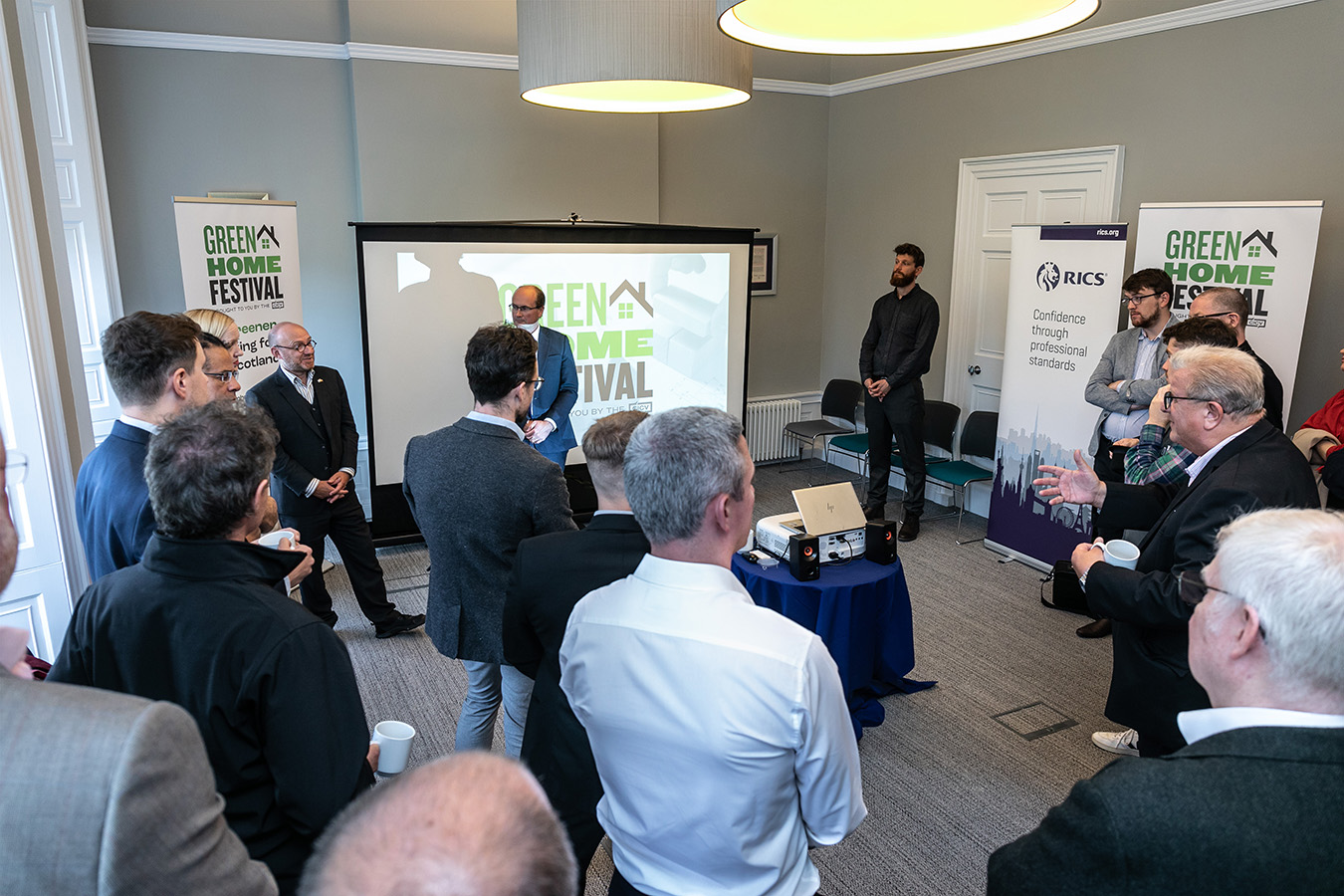Scotland faces a “monumental but essential task” if it is to overhaul its aged housing stock and find practical solutions to reduce emissions and address the climate emergency.
That was the message from Patrick Harvie yesterday (Monday 8 August) as he officially opened the first-ever Green Home Festival as part of the Edinburgh Festival Fringe.
The Minister for Zero Carbon Buildings, Active Travel and Tenants’ Rights was the keynote speaker at the launch ofthe five-day renewables jamboree, which has been organised by the Construction Industry Collective Voice (CICV).
Speaking to delegates at the Scottish headquarters of the Royal Institution of Chartered Surveyors (RICS), Mr Harvie outlined the scale of the challenge and some of the measures the Scottish Government was taking to try and tackle today’s environmental issues.
The Scottish Greens co-leader said: “Our homes and workplaces account for around a fifth of Scotland’s total greenhouse gas emissions. Our statutory target for 2030 means that we need to reduce emissions from heating buildings by 68% below their level in 2020.
“This is a monumental but essential task. Our building stock is relatively old, and wasn’t always built to high energy standards. This legacy of poor energy efficiency has contributed to emissions and fuel poverty, so we need to start drastically improving that standard.
“By 2030, we want to see a large majority of homes achieving a level of energy efficiency at least equivalent to an EPC C – with all homes meeting that standard by 2033, where feasible and cost effective. This will reduce emissions from our buildings, but it will also help make our energy more affordable, by removing poor energy efficiency as a driver of fuel poverty.”
Mr Harvie, who is MSP for the Glasgow region, also warned that, as well as improving energy efficiency, Scotland needs to switch to zero direct emissions heating.
He said: “Meeting our 2030 target means that we need over a million homes and the equivalent of 50,000 non-domestic buildings to switch from fossil fuels. This is a huge transition, affecting communities, businesses and homes across Scotland.
“Getting there will need a much faster installation rate for these zero direct emissions heating systems. In recent years that rate has been around 3,000 homes annually, but we need to reach around 200,000 each year in the latter part of this decade.”
Mr Harvie also said that the cost of living crisis and unprecedented surges in energy prices make the challenge even harder and the government can’t foot the bill on its own.
He said: “Our funding will make a huge difference to the heat transition. But the cost of transforming our building stock – around £33 billion to 2045 – can’t be met by government alone.
“Our Green Heat Finance Task Force is now working on innovative solutions to maximise private sector investment, and to find new ways to help spread the upfront cost of making properties warmer, greener and more energy efficient.”
Mr Harvie concluded: “We know there will be more issues to resolve and we intend to tackle these collaboratively, drawing on the best knowledge and ideas from across society.
“The climate emergency is already here. But if we adopt many of the actions and ideas being discussed at this week-long Green Home Festival, they will stand us in good stead to mitigate its worst consequences.”
Mr Harvie was guest of honour at the event at 10 Charlotte Square in central Edinburgh, where delegates gathered to kick of a week-long series of events delivering practical assistance and advice to help Scotland become a net zero nation.
Other speakers at the launch included Green Home Festival co-organiser Gordon Nelson, Scotland Director of the Federation of Master Builders, and Sandra Cummings, a Director at Faithful+Gould and Vice Chair of the RICS Scotland Board.
Mr Nelson said: “We were grateful to Mr Harvie for opening the Festival and we share his view that the time for waiting is over and urgent action is needed now.
“It is more important than ever that the construction industry and government work together to find practical solutions that help us build the net zero nation needed for future generations.”
The Green Home Festival will deliver 12 in-person and virtual presentations on green topics, targeting homeowners, construction professionals, housing associations and local authorities.
With contributions from the likes of SEPA, Home Energy Scotland, SELECT, SNIPEF, Gardiner & Theobald LLP and Atelier Ten, the range of topics will include:
- Protecting from flood risk
- Using sustainable materials
- Demystifying heat pumps
- Retrofitting tenements
- Building sustainable neighbourhoods
- An introduction to electric vehicles (EVs).
One online session, Taking the Swedish View, will see a presentation by award-winning Swedish construction company, Botkyrkabyggen, who use solar panels, windmills, artificial intelligence and district heating to improve energy efficiency.
In another event, Living Safely in the Future, experts from Electrical Safety First will outline what householders can do to ensure their homes are protected properly when installing the innovation and technology that is already becoming a part of everyday life.
Full details, including how to book tickets for each event, are available on the Festival’s website at greenhomefestival.co.uk.
The festival is the latest in a string of practical and constructive initiatives launched by the CICV since its creation at the start of the pandemic in March 2020.
Made up of 29 trade associations, professional services bodies and companies, it has maintained a steady supply of information and practical advice to the sector as well as carrying out surveys, producing animations and posters, hosting webinars and maintaining close dialogue with Scottish Government ministers.




